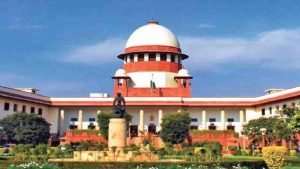
The Supreme Court today said that the Ministers, Members of Parliament (MPs) and the Members of Legislative Assembly (MLAs) are entitled for the freedom of speech like all other citizens under Article 19(1)(a) of the Constitution.
The Apex Court further said that greater or additional restrictions cannot be imposed on the fundamental right of free speech of such public functionaries.
The order was passed by 4:1 majority by a Constitution Bench comprising Justice S Abdul Nazeer, Justice AS Bopanna, Justice BR Gavai, Justice V Ramasubramanian and Justice BV Nagarathna.
Justice Ramasubramanian authored the judgment for Justice Nazeer, Justice Bopanna, Justice Gavai and himself.
He said the restrictions on freedom of speech of public functionaries like every citizen cannot go beyond what was prescribed under Article 19(2) of the Constitution, which were exhaustive and applicable to all citizens.
The Court said that the Additional restrictions not found under Article 19(2) cannot be imposed on the exercise of Article 19(1)(a).
The judgment was delivered on a batch of pleas pertaining to the scope of freedom of speech of public functionaries. The petitions had contended whether greater restrictions can be imposed on the right of public functionaries in the greater interest of citizens and their right to life and personal liberty.
The Court further said that the statement made by Minister related to government or its affairs cannot be vicariously attributed to the government.
The Constitution Bench ruled that a mere statement by a Minister inconsistent with the rights of citizen do not form to be a constitutional tort, but if it lead to omission or commission of offence by a public official, then it was a constitutional tort.
The Court held that the Right to Freedom of Speech and the restrictions can be exercised not only against the State but also against non-State actors.
“The right can be exercised even against other instrumentalities other than the State. State is under a duty to affirmatively protect fundamental right of a citizen even if the violation is by a non-state actor,” Justice Subramanian said.
Justice BV Nagarathna in a separate judgment held that the Court cannot impose any greater/additional restrictions on the fundamental right of free speech of such public functionaries.
It is for the parliament in its wisdom to enact a law to restrain public functionaries from making disparaging remarks against fellow citizens bearing in mind Article 19(1)(a) and 19(2), she ruled.
Justice Nagarathna, said that freedom of speech and expression is a much needed right so that citizens are well informed and educated on governance, it cannot turn into hate speech.
The Court said that hate speech in the sense strikes at the foundational values by making the society unequal ands also attacks citizens from diverse backgrounds especially in a country like us that is Bharat.
The judge also held that it shall be the duty of every Indian to uphold the dignity of every individual irrespective of religion, caste etc and also uphold the dignity of women.
Pertinently, she said that public functionaries and celebrities having regard to the reach and impact their statements can have on public, have to be more responsible and should exercise more restraint on speech since its impacts the citizens at large.
The post Supreme Court rules that additional restrictions cannot be imposed on freedom of speech of Ministers, MPs, MLAs appeared first on India Legal.

Please don't enter any spam link in comment box ConversionConversion EmoticonEmoticon